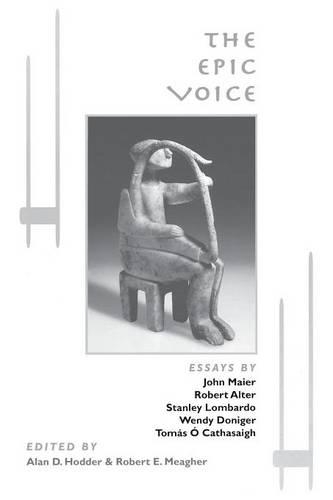
The Epic Voice
(Paperback)
Publishing Details
The Epic Voice
By (Author) Alan D. Hodder
Edited by Robert E. Meagher
Bloomsbury Publishing PLC
Praeger Publishers Inc
30th March 2002
United States
Classifications
Tertiary Education
Non Fiction
809.01
Physical Properties
Paperback
168
Description
Essays on five ancient epics--the Mesopotamian Epic of Gilgamesh, the Hebrew David Story from 1 and 2 Samuel and 1 Kings, the Greek Odyssey of Homer, the Indian Ramayana of Valmiki, and the Irish Tain Bo Cuailnge--each written by a renowned scholar and based on lectures and seminars given in the HampshireStudies in the Humanities series. Of the five works discussed herein--the Mesopotamian Epic of Gilgamesh, the Hebrew David Story from 1 and 2 Samuel and 1 Kings, the Greek Odyssey of Homer, the Indian Ramayana of Valmiki, and the Irish Tain Bo Cuailnge - only the Odyssey conforms precisely to the classical Western conception of the epic, but much is to be gained by considering these several ancient narratives collectively, as parts of a composite human whole. All are set in a time of historical beginnings, when acts of bravery, violence, and conquest proved instrumental in the formation of a people and the shaping of a nation. All recount the exploits of a hero or heroes whose triumphs - and failings--prove to have a decisive impact on the destiny of an age and a culture. All reflect an entrenched culture of warriors and kings, whose acts of heroism and prowess on the battlefield become the subjects of song and celebration for a people just begining to take stock of their historical, cultural, and religious heritage. In cultures wherein literacy was rare, books even rarer, mass media non-existent, and entertainments few, hunger for and delight in stories must have been common and intense. The oldest of the stories discussed in this collection, Gilgamesh, dates back almost five thousand years, yet it and the others still resonate with modern readers. There is much pleasure to be had in discovering the common themes these epics share, and in realizing that they are stories as much for today as for yesterday.
Reviews
"If an epic is "the tale of the tribe," the tribes are many and far-flung, yet the tales are always filled with human aspirations and heroic figures and vibrant with the epic voice-all borne out loud and clear throughout this handsome gathering of essays."-Robert Fagles Arthur W. Marks '10 Professor of Comparative Literature Princeton University
"The Epic Voice is a welcome addition to the small but growing corpus of genre studies. Although its format, complete with discussion questions, discussion points, and points for further investigation, makes The Epic Voice particularly useful to those seeking a textbook for use in an undergraduate course in epic literature, this exquisite collection of essays will be of interest to all who are interested in myth, epic, and religion. This work should be well received by the general public, students, and faculty alike."-Sara Mandell Professor of Religious Studies/Interdisciplinary Arts and Sciences The University of South Florida
"This collection of essays of five traditional epics offers its readers special perspectives generally not found in philological oriented discussions. A broad comparative literary approach is brought to the evolution into adulthood of the brash young Gilgamesh by John Maier; a soul-searching King David is lovingly analyzed by Robert Alter; and the wandering mind and body of Odysseus is placed in the larger philosophical context of noos "mind" and nostos "homecoming" by Stanley Lombardo. Wendy Doniger's highly entertaining exploration of divine, human and animal "shadows of the Ramayana" is an adventure in itself. The Irish Celtic epic of the Tain and its heroic characters are lined up for our scrutiny by Tomas O Cathasaigh in a way that throws new yet ancient light on conflicts between the Ulstermen and their enemies from Connaught, and all their kinship codes. Each essay is followed by useful study questions that will make this collection a wonderful teaching tool."-Anne D. Kilmer Department of Near Eastern Studies UC Berkeley
"This set of provocative essays, by some of the major scholars in their fields, gives teachers and students of folklore, epic, and myth a unique tool for probing the meanings and dynamics of seminal texts from a variety of cultures. The introduction provides a model to the study of oral tradition and argues eloquently for the contemporary relevance of the study of ancient, medieval, and oral narratives."-Joseph Nagy Professor of English University of California, Los Angeles
A useful book for alll academic readers, but especially for lower/upper-division undergraduates.-Choice
"A useful book for alll academic readers, but especially for lower/upper-division undergraduates."-Choice
Author Bio
ALAN D. HODDER is Associate Professor of Comparative Religion at Hampshire College. ROBERT E. MEAGHER is Professor of Humanities at Hampshire College.
